Power and Overconfident Decision-Making - Doc
VerifiedAdded on 2021/06/18
|8
|2729
|42
AI Summary
Contribute Materials
Your contribution can guide someone’s learning journey. Share your
documents today.
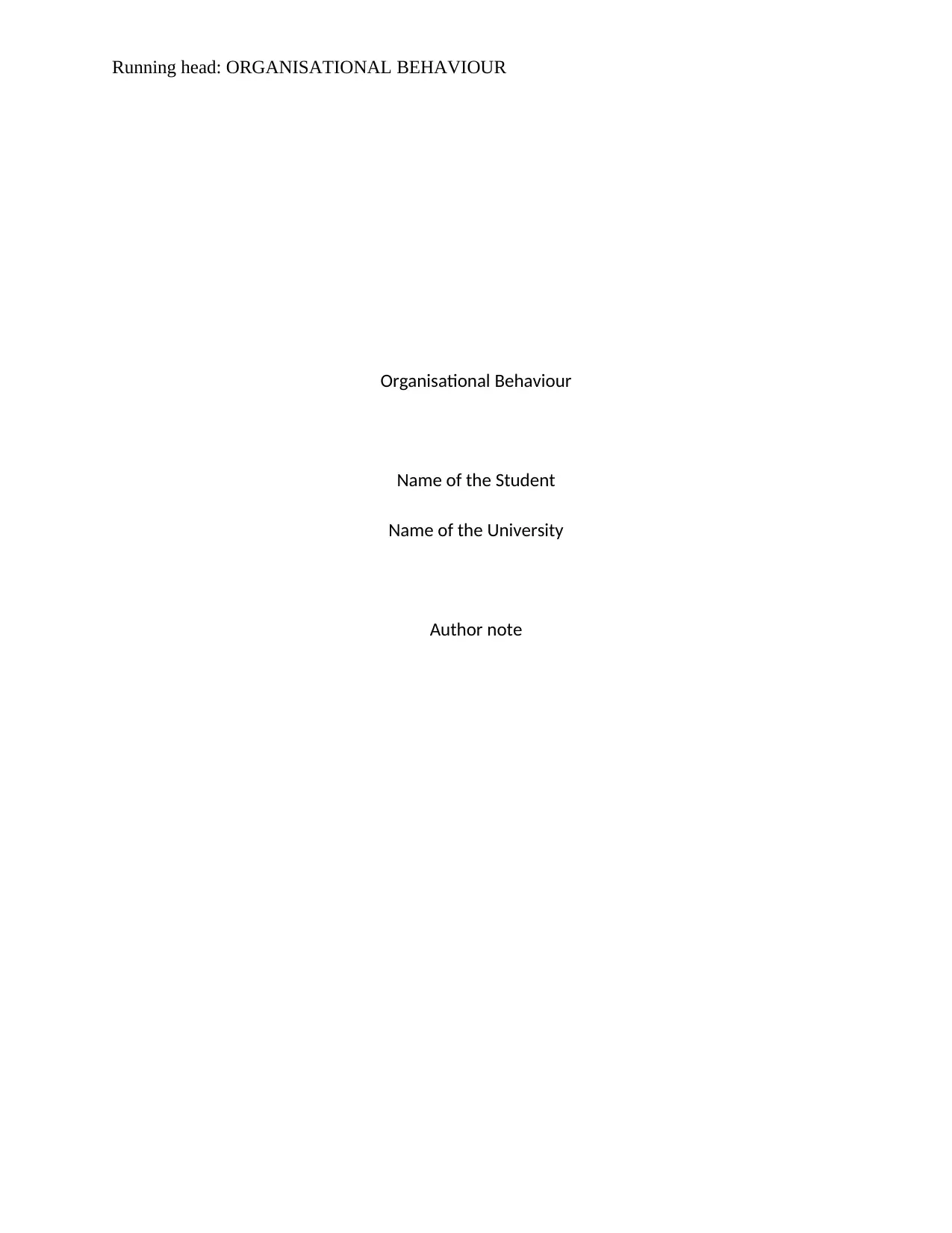
Running head: ORGANISATIONAL BEHAVIOUR
Organisational Behaviour
Name of the Student
Name of the University
Author note
Organisational Behaviour
Name of the Student
Name of the University
Author note
Secure Best Marks with AI Grader
Need help grading? Try our AI Grader for instant feedback on your assignments.
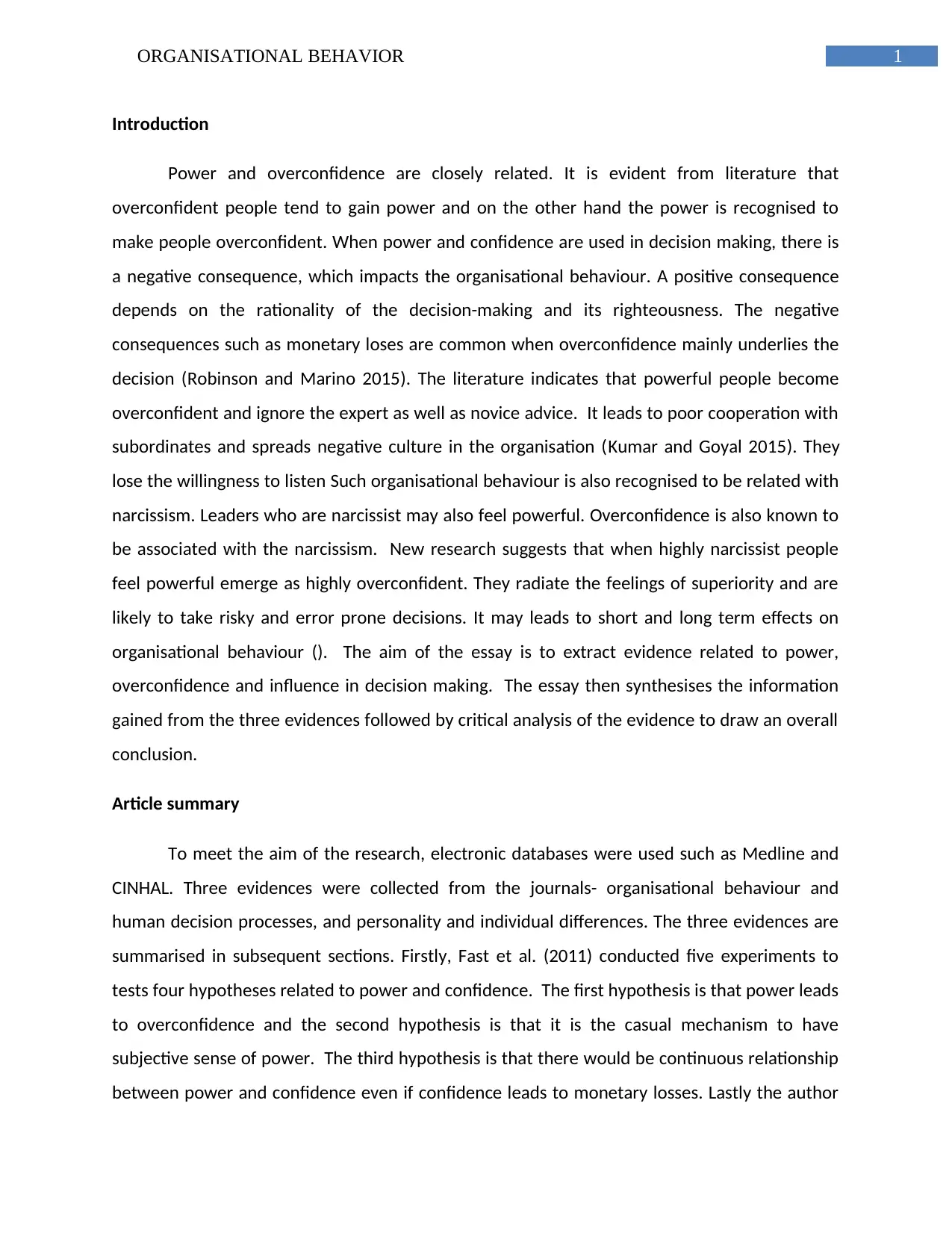
1ORGANISATIONAL BEHAVIOR
Introduction
Power and overconfidence are closely related. It is evident from literature that
overconfident people tend to gain power and on the other hand the power is recognised to
make people overconfident. When power and confidence are used in decision making, there is
a negative consequence, which impacts the organisational behaviour. A positive consequence
depends on the rationality of the decision-making and its righteousness. The negative
consequences such as monetary loses are common when overconfidence mainly underlies the
decision (Robinson and Marino 2015). The literature indicates that powerful people become
overconfident and ignore the expert as well as novice advice. It leads to poor cooperation with
subordinates and spreads negative culture in the organisation (Kumar and Goyal 2015). They
lose the willingness to listen Such organisational behaviour is also recognised to be related with
narcissism. Leaders who are narcissist may also feel powerful. Overconfidence is also known to
be associated with the narcissism. New research suggests that when highly narcissist people
feel powerful emerge as highly overconfident. They radiate the feelings of superiority and are
likely to take risky and error prone decisions. It may leads to short and long term effects on
organisational behaviour (). The aim of the essay is to extract evidence related to power,
overconfidence and influence in decision making. The essay then synthesises the information
gained from the three evidences followed by critical analysis of the evidence to draw an overall
conclusion.
Article summary
To meet the aim of the research, electronic databases were used such as Medline and
CINHAL. Three evidences were collected from the journals- organisational behaviour and
human decision processes, and personality and individual differences. The three evidences are
summarised in subsequent sections. Firstly, Fast et al. (2011) conducted five experiments to
tests four hypotheses related to power and confidence. The first hypothesis is that power leads
to overconfidence and the second hypothesis is that it is the casual mechanism to have
subjective sense of power. The third hypothesis is that there would be continuous relationship
between power and confidence even if confidence leads to monetary losses. Lastly the author
Introduction
Power and overconfidence are closely related. It is evident from literature that
overconfident people tend to gain power and on the other hand the power is recognised to
make people overconfident. When power and confidence are used in decision making, there is
a negative consequence, which impacts the organisational behaviour. A positive consequence
depends on the rationality of the decision-making and its righteousness. The negative
consequences such as monetary loses are common when overconfidence mainly underlies the
decision (Robinson and Marino 2015). The literature indicates that powerful people become
overconfident and ignore the expert as well as novice advice. It leads to poor cooperation with
subordinates and spreads negative culture in the organisation (Kumar and Goyal 2015). They
lose the willingness to listen Such organisational behaviour is also recognised to be related with
narcissism. Leaders who are narcissist may also feel powerful. Overconfidence is also known to
be associated with the narcissism. New research suggests that when highly narcissist people
feel powerful emerge as highly overconfident. They radiate the feelings of superiority and are
likely to take risky and error prone decisions. It may leads to short and long term effects on
organisational behaviour (). The aim of the essay is to extract evidence related to power,
overconfidence and influence in decision making. The essay then synthesises the information
gained from the three evidences followed by critical analysis of the evidence to draw an overall
conclusion.
Article summary
To meet the aim of the research, electronic databases were used such as Medline and
CINHAL. Three evidences were collected from the journals- organisational behaviour and
human decision processes, and personality and individual differences. The three evidences are
summarised in subsequent sections. Firstly, Fast et al. (2011) conducted five experiments to
tests four hypotheses related to power and confidence. The first hypothesis is that power leads
to overconfidence and the second hypothesis is that it is the casual mechanism to have
subjective sense of power. The third hypothesis is that there would be continuous relationship
between power and confidence even if confidence leads to monetary losses. Lastly the author
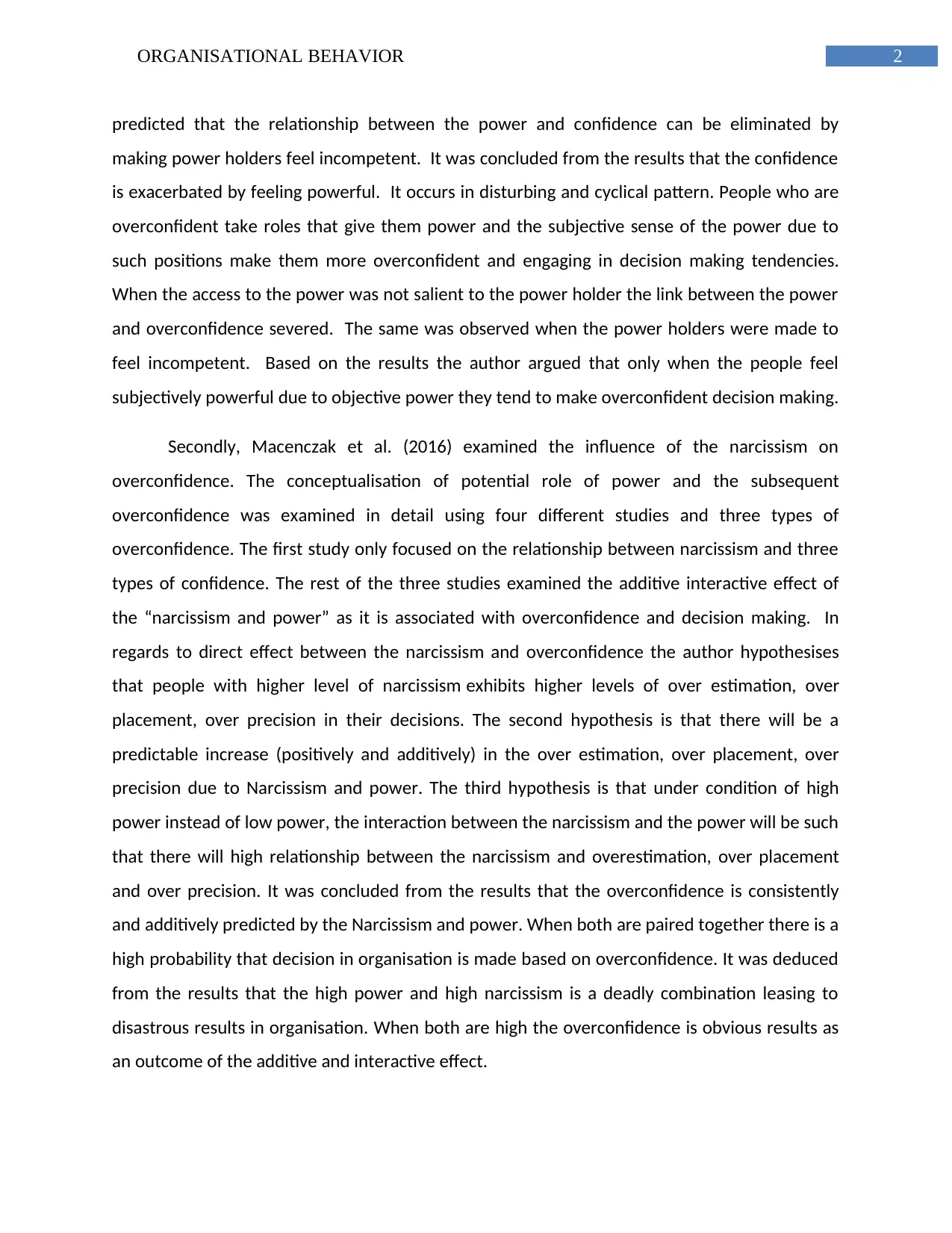
2ORGANISATIONAL BEHAVIOR
predicted that the relationship between the power and confidence can be eliminated by
making power holders feel incompetent. It was concluded from the results that the confidence
is exacerbated by feeling powerful. It occurs in disturbing and cyclical pattern. People who are
overconfident take roles that give them power and the subjective sense of the power due to
such positions make them more overconfident and engaging in decision making tendencies.
When the access to the power was not salient to the power holder the link between the power
and overconfidence severed. The same was observed when the power holders were made to
feel incompetent. Based on the results the author argued that only when the people feel
subjectively powerful due to objective power they tend to make overconfident decision making.
Secondly, Macenczak et al. (2016) examined the influence of the narcissism on
overconfidence. The conceptualisation of potential role of power and the subsequent
overconfidence was examined in detail using four different studies and three types of
overconfidence. The first study only focused on the relationship between narcissism and three
types of confidence. The rest of the three studies examined the additive interactive effect of
the “narcissism and power” as it is associated with overconfidence and decision making. In
regards to direct effect between the narcissism and overconfidence the author hypothesises
that people with higher level of narcissism exhibits higher levels of over estimation, over
placement, over precision in their decisions. The second hypothesis is that there will be a
predictable increase (positively and additively) in the over estimation, over placement, over
precision due to Narcissism and power. The third hypothesis is that under condition of high
power instead of low power, the interaction between the narcissism and the power will be such
that there will high relationship between the narcissism and overestimation, over placement
and over precision. It was concluded from the results that the overconfidence is consistently
and additively predicted by the Narcissism and power. When both are paired together there is a
high probability that decision in organisation is made based on overconfidence. It was deduced
from the results that the high power and high narcissism is a deadly combination leasing to
disastrous results in organisation. When both are high the overconfidence is obvious results as
an outcome of the additive and interactive effect.
predicted that the relationship between the power and confidence can be eliminated by
making power holders feel incompetent. It was concluded from the results that the confidence
is exacerbated by feeling powerful. It occurs in disturbing and cyclical pattern. People who are
overconfident take roles that give them power and the subjective sense of the power due to
such positions make them more overconfident and engaging in decision making tendencies.
When the access to the power was not salient to the power holder the link between the power
and overconfidence severed. The same was observed when the power holders were made to
feel incompetent. Based on the results the author argued that only when the people feel
subjectively powerful due to objective power they tend to make overconfident decision making.
Secondly, Macenczak et al. (2016) examined the influence of the narcissism on
overconfidence. The conceptualisation of potential role of power and the subsequent
overconfidence was examined in detail using four different studies and three types of
overconfidence. The first study only focused on the relationship between narcissism and three
types of confidence. The rest of the three studies examined the additive interactive effect of
the “narcissism and power” as it is associated with overconfidence and decision making. In
regards to direct effect between the narcissism and overconfidence the author hypothesises
that people with higher level of narcissism exhibits higher levels of over estimation, over
placement, over precision in their decisions. The second hypothesis is that there will be a
predictable increase (positively and additively) in the over estimation, over placement, over
precision due to Narcissism and power. The third hypothesis is that under condition of high
power instead of low power, the interaction between the narcissism and the power will be such
that there will high relationship between the narcissism and overestimation, over placement
and over precision. It was concluded from the results that the overconfidence is consistently
and additively predicted by the Narcissism and power. When both are paired together there is a
high probability that decision in organisation is made based on overconfidence. It was deduced
from the results that the high power and high narcissism is a deadly combination leasing to
disastrous results in organisation. When both are high the overconfidence is obvious results as
an outcome of the additive and interactive effect.
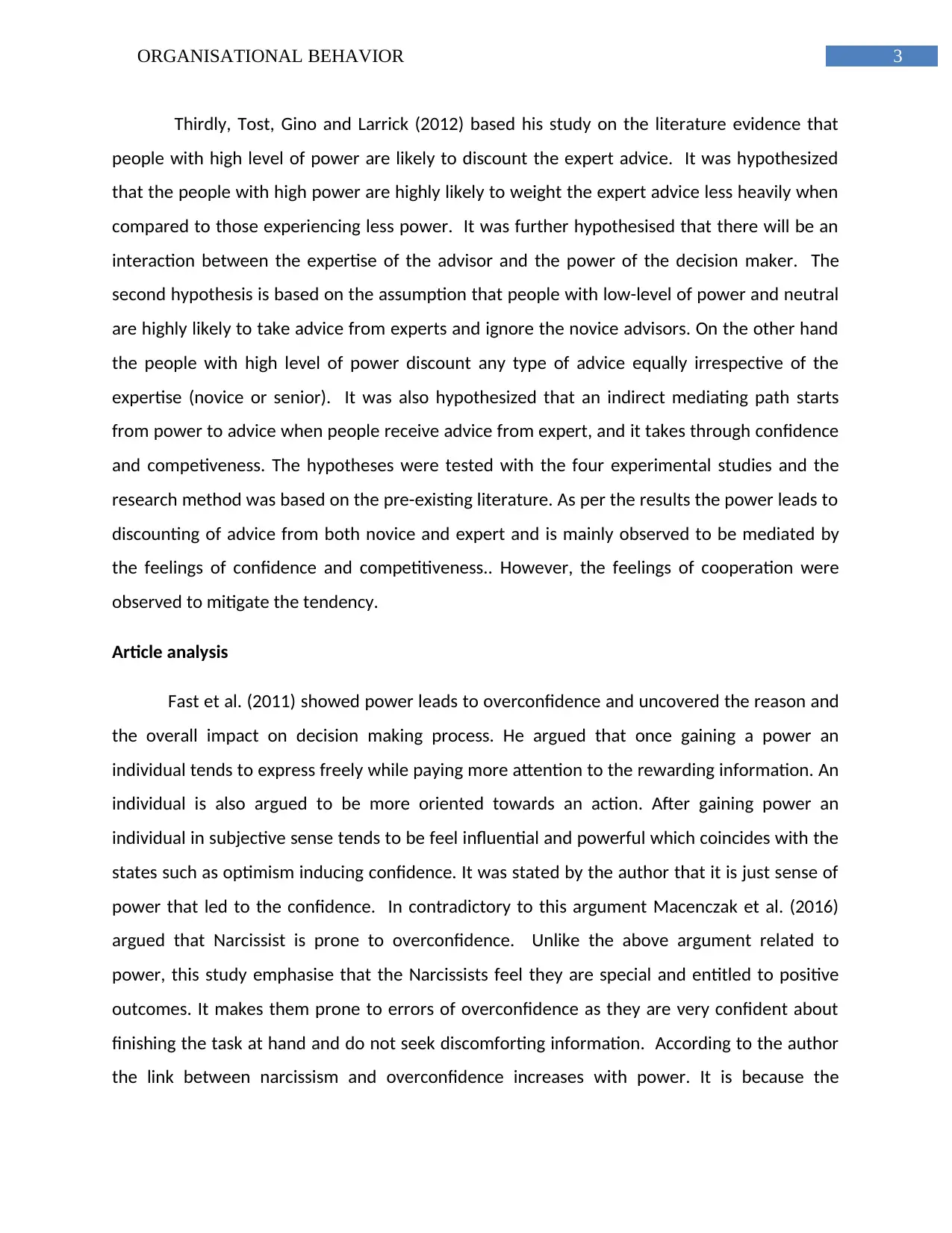
3ORGANISATIONAL BEHAVIOR
Thirdly, Tost, Gino and Larrick (2012) based his study on the literature evidence that
people with high level of power are likely to discount the expert advice. It was hypothesized
that the people with high power are highly likely to weight the expert advice less heavily when
compared to those experiencing less power. It was further hypothesised that there will be an
interaction between the expertise of the advisor and the power of the decision maker. The
second hypothesis is based on the assumption that people with low-level of power and neutral
are highly likely to take advice from experts and ignore the novice advisors. On the other hand
the people with high level of power discount any type of advice equally irrespective of the
expertise (novice or senior). It was also hypothesized that an indirect mediating path starts
from power to advice when people receive advice from expert, and it takes through confidence
and competiveness. The hypotheses were tested with the four experimental studies and the
research method was based on the pre-existing literature. As per the results the power leads to
discounting of advice from both novice and expert and is mainly observed to be mediated by
the feelings of confidence and competitiveness.. However, the feelings of cooperation were
observed to mitigate the tendency.
Article analysis
Fast et al. (2011) showed power leads to overconfidence and uncovered the reason and
the overall impact on decision making process. He argued that once gaining a power an
individual tends to express freely while paying more attention to the rewarding information. An
individual is also argued to be more oriented towards an action. After gaining power an
individual in subjective sense tends to be feel influential and powerful which coincides with the
states such as optimism inducing confidence. It was stated by the author that it is just sense of
power that led to the confidence. In contradictory to this argument Macenczak et al. (2016)
argued that Narcissist is prone to overconfidence. Unlike the above argument related to
power, this study emphasise that the Narcissists feel they are special and entitled to positive
outcomes. It makes them prone to errors of overconfidence as they are very confident about
finishing the task at hand and do not seek discomforting information. According to the author
the link between narcissism and overconfidence increases with power. It is because the
Thirdly, Tost, Gino and Larrick (2012) based his study on the literature evidence that
people with high level of power are likely to discount the expert advice. It was hypothesized
that the people with high power are highly likely to weight the expert advice less heavily when
compared to those experiencing less power. It was further hypothesised that there will be an
interaction between the expertise of the advisor and the power of the decision maker. The
second hypothesis is based on the assumption that people with low-level of power and neutral
are highly likely to take advice from experts and ignore the novice advisors. On the other hand
the people with high level of power discount any type of advice equally irrespective of the
expertise (novice or senior). It was also hypothesized that an indirect mediating path starts
from power to advice when people receive advice from expert, and it takes through confidence
and competiveness. The hypotheses were tested with the four experimental studies and the
research method was based on the pre-existing literature. As per the results the power leads to
discounting of advice from both novice and expert and is mainly observed to be mediated by
the feelings of confidence and competitiveness.. However, the feelings of cooperation were
observed to mitigate the tendency.
Article analysis
Fast et al. (2011) showed power leads to overconfidence and uncovered the reason and
the overall impact on decision making process. He argued that once gaining a power an
individual tends to express freely while paying more attention to the rewarding information. An
individual is also argued to be more oriented towards an action. After gaining power an
individual in subjective sense tends to be feel influential and powerful which coincides with the
states such as optimism inducing confidence. It was stated by the author that it is just sense of
power that led to the confidence. In contradictory to this argument Macenczak et al. (2016)
argued that Narcissist is prone to overconfidence. Unlike the above argument related to
power, this study emphasise that the Narcissists feel they are special and entitled to positive
outcomes. It makes them prone to errors of overconfidence as they are very confident about
finishing the task at hand and do not seek discomforting information. According to the author
the link between narcissism and overconfidence increases with power. It is because the
Secure Best Marks with AI Grader
Need help grading? Try our AI Grader for instant feedback on your assignments.
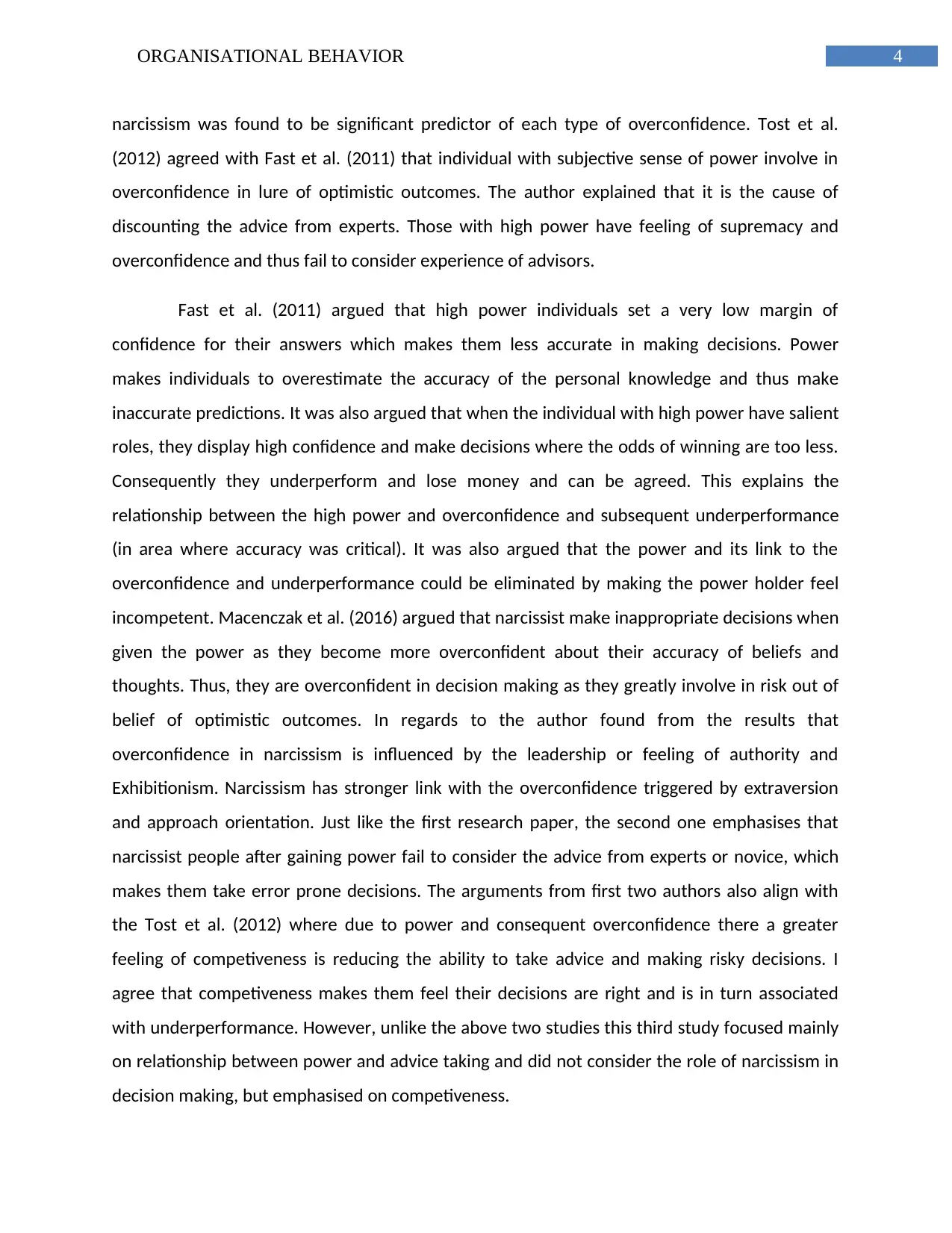
4ORGANISATIONAL BEHAVIOR
narcissism was found to be significant predictor of each type of overconfidence. Tost et al.
(2012) agreed with Fast et al. (2011) that individual with subjective sense of power involve in
overconfidence in lure of optimistic outcomes. The author explained that it is the cause of
discounting the advice from experts. Those with high power have feeling of supremacy and
overconfidence and thus fail to consider experience of advisors.
Fast et al. (2011) argued that high power individuals set a very low margin of
confidence for their answers which makes them less accurate in making decisions. Power
makes individuals to overestimate the accuracy of the personal knowledge and thus make
inaccurate predictions. It was also argued that when the individual with high power have salient
roles, they display high confidence and make decisions where the odds of winning are too less.
Consequently they underperform and lose money and can be agreed. This explains the
relationship between the high power and overconfidence and subsequent underperformance
(in area where accuracy was critical). It was also argued that the power and its link to the
overconfidence and underperformance could be eliminated by making the power holder feel
incompetent. Macenczak et al. (2016) argued that narcissist make inappropriate decisions when
given the power as they become more overconfident about their accuracy of beliefs and
thoughts. Thus, they are overconfident in decision making as they greatly involve in risk out of
belief of optimistic outcomes. In regards to the author found from the results that
overconfidence in narcissism is influenced by the leadership or feeling of authority and
Exhibitionism. Narcissism has stronger link with the overconfidence triggered by extraversion
and approach orientation. Just like the first research paper, the second one emphasises that
narcissist people after gaining power fail to consider the advice from experts or novice, which
makes them take error prone decisions. The arguments from first two authors also align with
the Tost et al. (2012) where due to power and consequent overconfidence there a greater
feeling of competiveness is reducing the ability to take advice and making risky decisions. I
agree that competiveness makes them feel their decisions are right and is in turn associated
with underperformance. However, unlike the above two studies this third study focused mainly
on relationship between power and advice taking and did not consider the role of narcissism in
decision making, but emphasised on competiveness.
narcissism was found to be significant predictor of each type of overconfidence. Tost et al.
(2012) agreed with Fast et al. (2011) that individual with subjective sense of power involve in
overconfidence in lure of optimistic outcomes. The author explained that it is the cause of
discounting the advice from experts. Those with high power have feeling of supremacy and
overconfidence and thus fail to consider experience of advisors.
Fast et al. (2011) argued that high power individuals set a very low margin of
confidence for their answers which makes them less accurate in making decisions. Power
makes individuals to overestimate the accuracy of the personal knowledge and thus make
inaccurate predictions. It was also argued that when the individual with high power have salient
roles, they display high confidence and make decisions where the odds of winning are too less.
Consequently they underperform and lose money and can be agreed. This explains the
relationship between the high power and overconfidence and subsequent underperformance
(in area where accuracy was critical). It was also argued that the power and its link to the
overconfidence and underperformance could be eliminated by making the power holder feel
incompetent. Macenczak et al. (2016) argued that narcissist make inappropriate decisions when
given the power as they become more overconfident about their accuracy of beliefs and
thoughts. Thus, they are overconfident in decision making as they greatly involve in risk out of
belief of optimistic outcomes. In regards to the author found from the results that
overconfidence in narcissism is influenced by the leadership or feeling of authority and
Exhibitionism. Narcissism has stronger link with the overconfidence triggered by extraversion
and approach orientation. Just like the first research paper, the second one emphasises that
narcissist people after gaining power fail to consider the advice from experts or novice, which
makes them take error prone decisions. The arguments from first two authors also align with
the Tost et al. (2012) where due to power and consequent overconfidence there a greater
feeling of competiveness is reducing the ability to take advice and making risky decisions. I
agree that competiveness makes them feel their decisions are right and is in turn associated
with underperformance. However, unlike the above two studies this third study focused mainly
on relationship between power and advice taking and did not consider the role of narcissism in
decision making, but emphasised on competiveness.
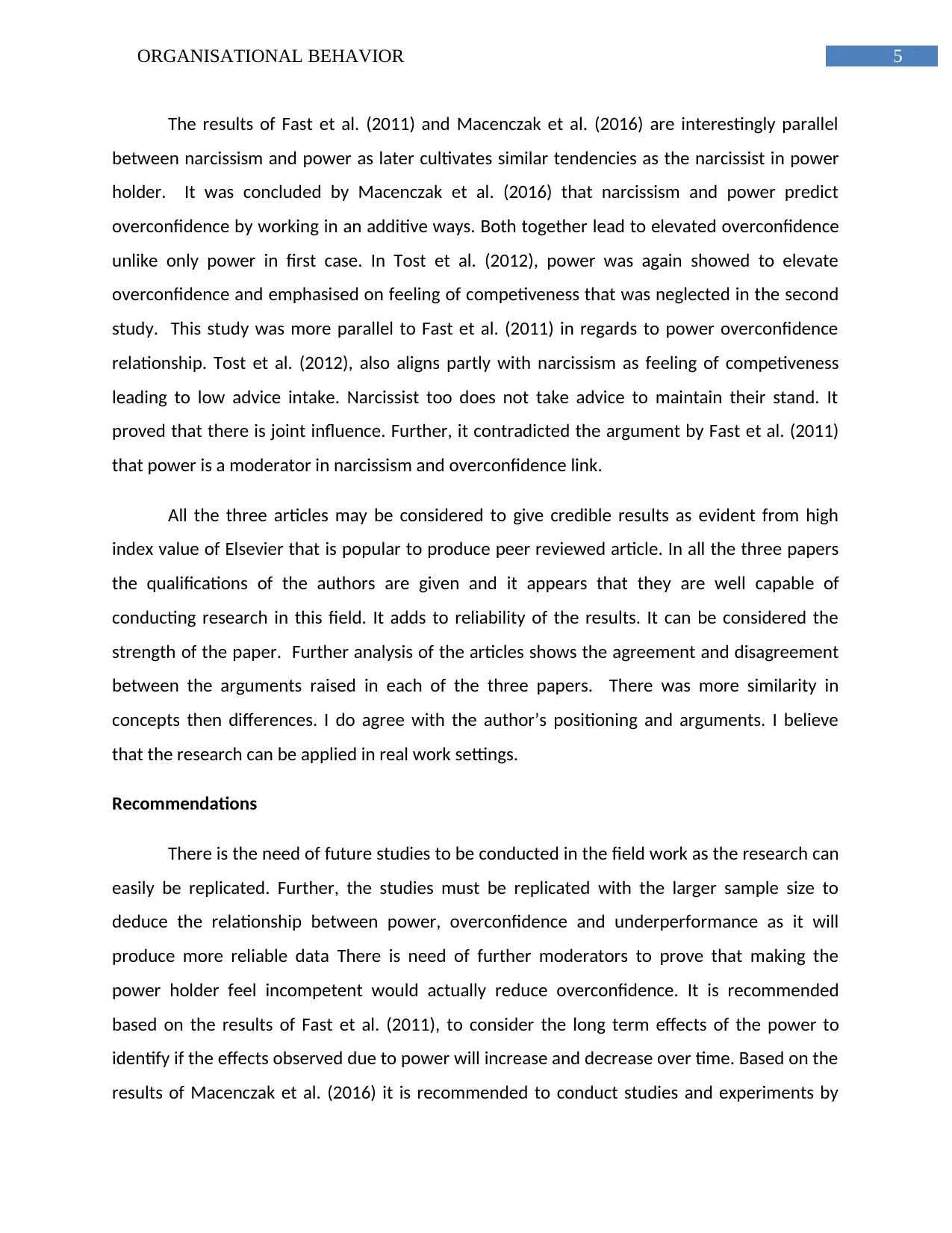
5ORGANISATIONAL BEHAVIOR
The results of Fast et al. (2011) and Macenczak et al. (2016) are interestingly parallel
between narcissism and power as later cultivates similar tendencies as the narcissist in power
holder. It was concluded by Macenczak et al. (2016) that narcissism and power predict
overconfidence by working in an additive ways. Both together lead to elevated overconfidence
unlike only power in first case. In Tost et al. (2012), power was again showed to elevate
overconfidence and emphasised on feeling of competiveness that was neglected in the second
study. This study was more parallel to Fast et al. (2011) in regards to power overconfidence
relationship. Tost et al. (2012), also aligns partly with narcissism as feeling of competiveness
leading to low advice intake. Narcissist too does not take advice to maintain their stand. It
proved that there is joint influence. Further, it contradicted the argument by Fast et al. (2011)
that power is a moderator in narcissism and overconfidence link.
All the three articles may be considered to give credible results as evident from high
index value of Elsevier that is popular to produce peer reviewed article. In all the three papers
the qualifications of the authors are given and it appears that they are well capable of
conducting research in this field. It adds to reliability of the results. It can be considered the
strength of the paper. Further analysis of the articles shows the agreement and disagreement
between the arguments raised in each of the three papers. There was more similarity in
concepts then differences. I do agree with the author’s positioning and arguments. I believe
that the research can be applied in real work settings.
Recommendations
There is the need of future studies to be conducted in the field work as the research can
easily be replicated. Further, the studies must be replicated with the larger sample size to
deduce the relationship between power, overconfidence and underperformance as it will
produce more reliable data There is need of further moderators to prove that making the
power holder feel incompetent would actually reduce overconfidence. It is recommended
based on the results of Fast et al. (2011), to consider the long term effects of the power to
identify if the effects observed due to power will increase and decrease over time. Based on the
results of Macenczak et al. (2016) it is recommended to conduct studies and experiments by
The results of Fast et al. (2011) and Macenczak et al. (2016) are interestingly parallel
between narcissism and power as later cultivates similar tendencies as the narcissist in power
holder. It was concluded by Macenczak et al. (2016) that narcissism and power predict
overconfidence by working in an additive ways. Both together lead to elevated overconfidence
unlike only power in first case. In Tost et al. (2012), power was again showed to elevate
overconfidence and emphasised on feeling of competiveness that was neglected in the second
study. This study was more parallel to Fast et al. (2011) in regards to power overconfidence
relationship. Tost et al. (2012), also aligns partly with narcissism as feeling of competiveness
leading to low advice intake. Narcissist too does not take advice to maintain their stand. It
proved that there is joint influence. Further, it contradicted the argument by Fast et al. (2011)
that power is a moderator in narcissism and overconfidence link.
All the three articles may be considered to give credible results as evident from high
index value of Elsevier that is popular to produce peer reviewed article. In all the three papers
the qualifications of the authors are given and it appears that they are well capable of
conducting research in this field. It adds to reliability of the results. It can be considered the
strength of the paper. Further analysis of the articles shows the agreement and disagreement
between the arguments raised in each of the three papers. There was more similarity in
concepts then differences. I do agree with the author’s positioning and arguments. I believe
that the research can be applied in real work settings.
Recommendations
There is the need of future studies to be conducted in the field work as the research can
easily be replicated. Further, the studies must be replicated with the larger sample size to
deduce the relationship between power, overconfidence and underperformance as it will
produce more reliable data There is need of further moderators to prove that making the
power holder feel incompetent would actually reduce overconfidence. It is recommended
based on the results of Fast et al. (2011), to consider the long term effects of the power to
identify if the effects observed due to power will increase and decrease over time. Based on the
results of Macenczak et al. (2016) it is recommended to conduct studies and experiments by
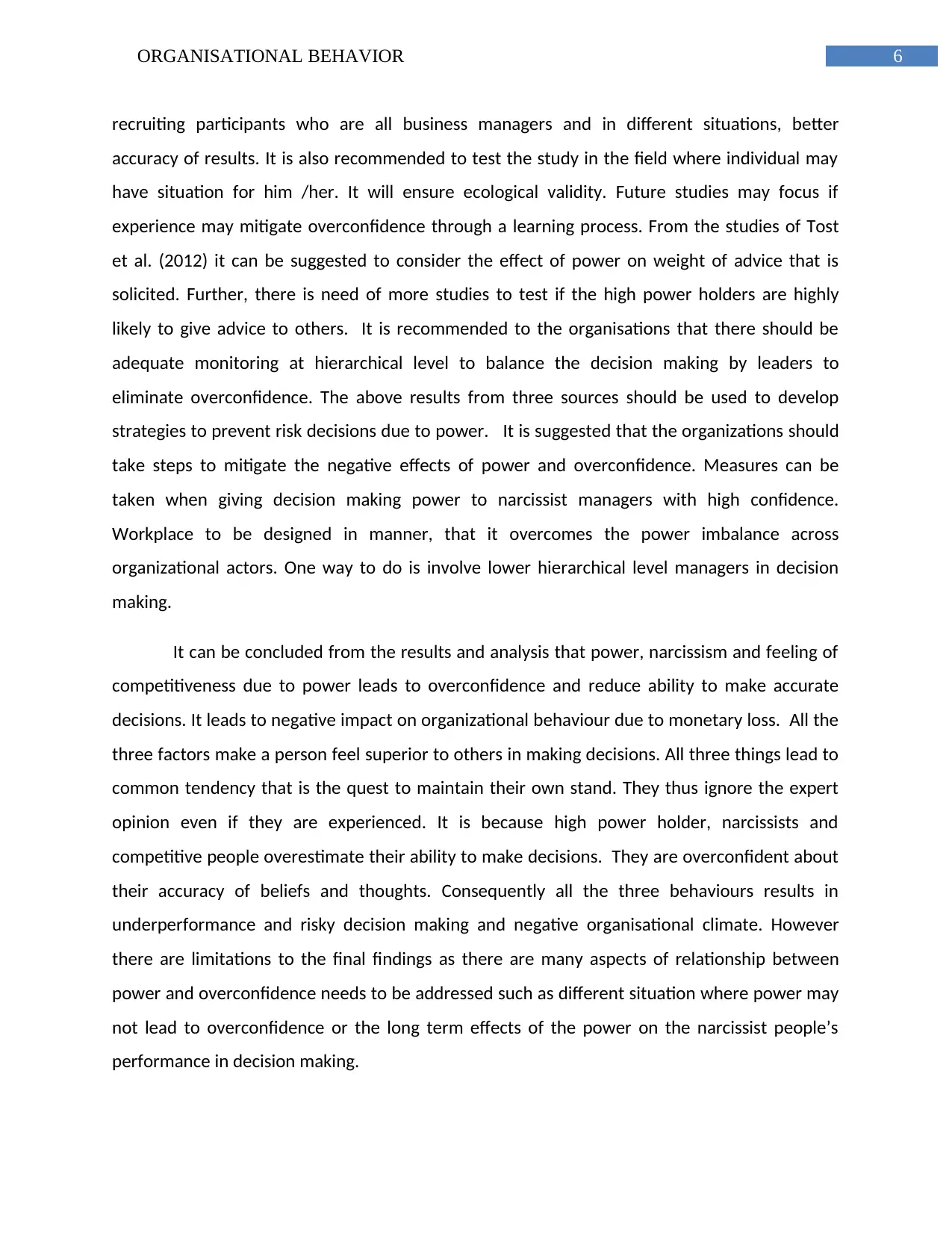
6ORGANISATIONAL BEHAVIOR
recruiting participants who are all business managers and in different situations, better
accuracy of results. It is also recommended to test the study in the field where individual may
have situation for him /her. It will ensure ecological validity. Future studies may focus if
experience may mitigate overconfidence through a learning process. From the studies of Tost
et al. (2012) it can be suggested to consider the effect of power on weight of advice that is
solicited. Further, there is need of more studies to test if the high power holders are highly
likely to give advice to others. It is recommended to the organisations that there should be
adequate monitoring at hierarchical level to balance the decision making by leaders to
eliminate overconfidence. The above results from three sources should be used to develop
strategies to prevent risk decisions due to power. It is suggested that the organizations should
take steps to mitigate the negative effects of power and overconfidence. Measures can be
taken when giving decision making power to narcissist managers with high confidence.
Workplace to be designed in manner, that it overcomes the power imbalance across
organizational actors. One way to do is involve lower hierarchical level managers in decision
making.
It can be concluded from the results and analysis that power, narcissism and feeling of
competitiveness due to power leads to overconfidence and reduce ability to make accurate
decisions. It leads to negative impact on organizational behaviour due to monetary loss. All the
three factors make a person feel superior to others in making decisions. All three things lead to
common tendency that is the quest to maintain their own stand. They thus ignore the expert
opinion even if they are experienced. It is because high power holder, narcissists and
competitive people overestimate their ability to make decisions. They are overconfident about
their accuracy of beliefs and thoughts. Consequently all the three behaviours results in
underperformance and risky decision making and negative organisational climate. However
there are limitations to the final findings as there are many aspects of relationship between
power and overconfidence needs to be addressed such as different situation where power may
not lead to overconfidence or the long term effects of the power on the narcissist people’s
performance in decision making.
recruiting participants who are all business managers and in different situations, better
accuracy of results. It is also recommended to test the study in the field where individual may
have situation for him /her. It will ensure ecological validity. Future studies may focus if
experience may mitigate overconfidence through a learning process. From the studies of Tost
et al. (2012) it can be suggested to consider the effect of power on weight of advice that is
solicited. Further, there is need of more studies to test if the high power holders are highly
likely to give advice to others. It is recommended to the organisations that there should be
adequate monitoring at hierarchical level to balance the decision making by leaders to
eliminate overconfidence. The above results from three sources should be used to develop
strategies to prevent risk decisions due to power. It is suggested that the organizations should
take steps to mitigate the negative effects of power and overconfidence. Measures can be
taken when giving decision making power to narcissist managers with high confidence.
Workplace to be designed in manner, that it overcomes the power imbalance across
organizational actors. One way to do is involve lower hierarchical level managers in decision
making.
It can be concluded from the results and analysis that power, narcissism and feeling of
competitiveness due to power leads to overconfidence and reduce ability to make accurate
decisions. It leads to negative impact on organizational behaviour due to monetary loss. All the
three factors make a person feel superior to others in making decisions. All three things lead to
common tendency that is the quest to maintain their own stand. They thus ignore the expert
opinion even if they are experienced. It is because high power holder, narcissists and
competitive people overestimate their ability to make decisions. They are overconfident about
their accuracy of beliefs and thoughts. Consequently all the three behaviours results in
underperformance and risky decision making and negative organisational climate. However
there are limitations to the final findings as there are many aspects of relationship between
power and overconfidence needs to be addressed such as different situation where power may
not lead to overconfidence or the long term effects of the power on the narcissist people’s
performance in decision making.
Paraphrase This Document
Need a fresh take? Get an instant paraphrase of this document with our AI Paraphraser
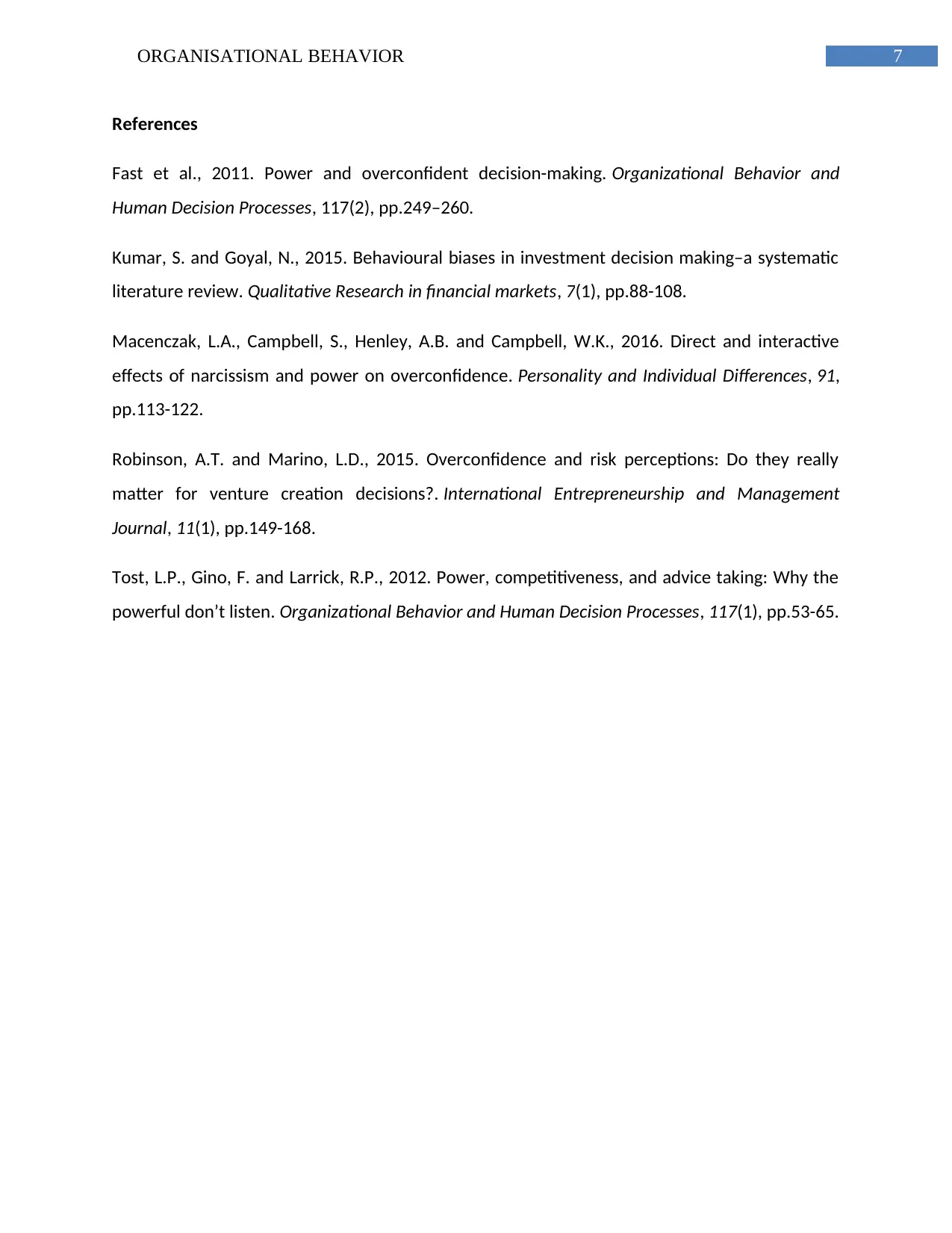
7ORGANISATIONAL BEHAVIOR
References
Fast et al., 2011. Power and overconfident decision-making. Organizational Behavior and
Human Decision Processes, 117(2), pp.249–260.
Kumar, S. and Goyal, N., 2015. Behavioural biases in investment decision making–a systematic
literature review. Qualitative Research in financial markets, 7(1), pp.88-108.
Macenczak, L.A., Campbell, S., Henley, A.B. and Campbell, W.K., 2016. Direct and interactive
effects of narcissism and power on overconfidence. Personality and Individual Differences, 91,
pp.113-122.
Robinson, A.T. and Marino, L.D., 2015. Overconfidence and risk perceptions: Do they really
matter for venture creation decisions?. International Entrepreneurship and Management
Journal, 11(1), pp.149-168.
Tost, L.P., Gino, F. and Larrick, R.P., 2012. Power, competitiveness, and advice taking: Why the
powerful don’t listen. Organizational Behavior and Human Decision Processes, 117(1), pp.53-65.
References
Fast et al., 2011. Power and overconfident decision-making. Organizational Behavior and
Human Decision Processes, 117(2), pp.249–260.
Kumar, S. and Goyal, N., 2015. Behavioural biases in investment decision making–a systematic
literature review. Qualitative Research in financial markets, 7(1), pp.88-108.
Macenczak, L.A., Campbell, S., Henley, A.B. and Campbell, W.K., 2016. Direct and interactive
effects of narcissism and power on overconfidence. Personality and Individual Differences, 91,
pp.113-122.
Robinson, A.T. and Marino, L.D., 2015. Overconfidence and risk perceptions: Do they really
matter for venture creation decisions?. International Entrepreneurship and Management
Journal, 11(1), pp.149-168.
Tost, L.P., Gino, F. and Larrick, R.P., 2012. Power, competitiveness, and advice taking: Why the
powerful don’t listen. Organizational Behavior and Human Decision Processes, 117(1), pp.53-65.
1 out of 8
Related Documents
Your All-in-One AI-Powered Toolkit for Academic Success.
+13062052269
info@desklib.com
Available 24*7 on WhatsApp / Email
![[object Object]](/_next/static/media/star-bottom.7253800d.svg)
Unlock your academic potential
© 2024 | Zucol Services PVT LTD | All rights reserved.




